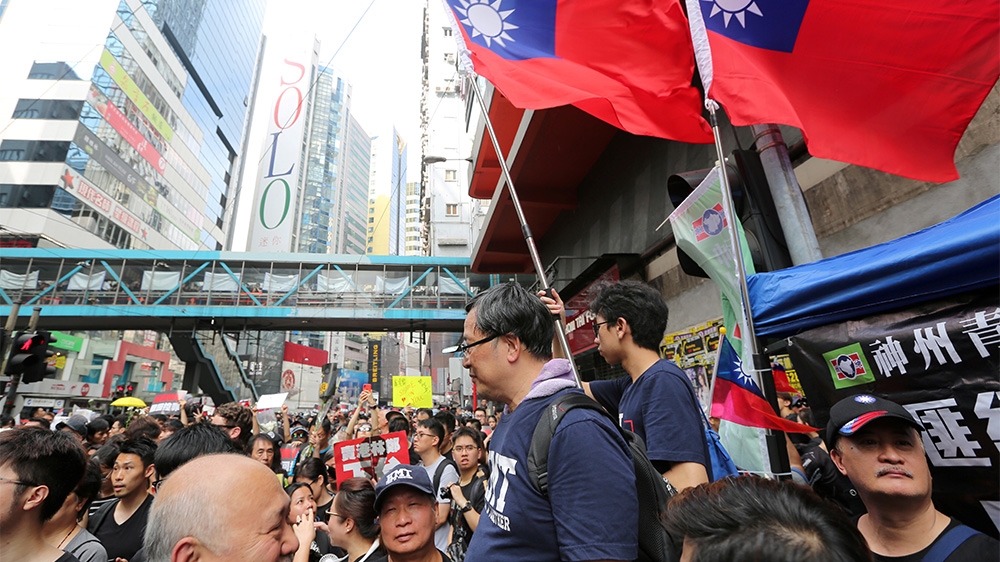‘Outsider’ hopes for success in Taiwan poll as China looms
Han Kuo-yu pulled a surprise in Kaohsiung in November, but presidential race may be more of a challenge.

Taipei, Taiwan – Han Kuo-yu was largely unknown until becoming the mayor of Taiwan’s southern city of Kaohsiung in November last year. But now, he is hoping his “outsider” status within an establishment party can help him become Taiwan‘s next president – even as China ratchets up its rhetoric on the island it views as its own.
Han, who is due to make his first policy speech on Sunday, was chosen earlier this month as the candidate of the opposition and pro-China Kuomintang (KMT) to take on President Tsai Ing-wen, of the pro-independence Democratic Progressive Party (DPP), in January’s election.
The 62-year-old, who is seen as representing neither the mainstream KMT nor Taiwan’s political establishment, on July 15 beat four rivals to the nomination including Terry Gou, the billionaire founder of tech equipment maker Foxconn.
At a rally in the capital, Taipei, on June 1, Han had told a crowd of at least tens of thousands of supporters that he would be a “president for the common people”.
“He’s a populist. His fa da cai [get rich] rhetoric is appealing to people in the same way a lot of [United States President Donald] Trump’s empty rhetoric appeals to a lot of Americans,” said Lev Nachman, a PhD candidate in political science at the University of California, Irvine, and a Fulbright research fellow in Taiwan who studies social movements and political parties on the island.
|
|
“His ability to appeal in this manner is what has led to his success so far,” he told Al Jazeera, adding that there was an element of class-based support during Han’s mayoral election.
‘China hope’
Han got his start in politics as a member of Taiwan’s legislature in 1993, but it was not until his Kaohsiung election win that he was pushed into the limelight.
The southern city had been a DPP fortress for 20 years, but Han wooed voters with promises to address a series of financial grievances, including the rising cost of living, stagnant wages, a moribund job market and increasing inequality.
While Han also promised voters he was willing to be “smashed to pieces for the Republic of China”, referring to Taiwan’s official name, he also supported a deeper economic relationship with the mainland.
“He is playing the ‘China hope’ card [as KMT’s presidential candidate], pledging close ties with China as an immediate fix to Taiwan’s economic woes,” said Jonathan Sullivan, a researcher of Taiwanese politics and the director of the China Policy Institute at the University of Nottingham.

Originally founded in 1912 in mainland China, the Republic of China under the nationalists relocated to Taiwan in 1949 after losing a civil war to the communists.
After decades of authoritarian rule, direct presidential elections were introduced in 1996 and the island is now a thriving democracy with a technology-driven economy. Growth in 2018 was 2.6 percent.
But China has long maintained that Taiwan is part of its territory – the so-called “one China principle”. This week, a white paper by the Chinese defence ministry reiterated Beijing’s willingness to retake the island by force if necessary.
The Chinese government cut off its communication channel with the island after Tsai became president in 2016 and refused to recognise the “one China principle”.
In recent years, it has also sought to cultivate the island’s few remaining diplomatic allies, with five countries – including traditional allies El Salvador and Panama – shifting ties to the mainland during Tsai’s term in office.
But Tsai has found renewed support in Western capitals.
The US agreed this month to sell arms worth $2.2bn to Taiwan – a move which China said “severely violated the basic norms of international law and international relations”.
This came as Tsai made stops in both New York and Denver as she toured a number of Taiwan’s diplomatic allies in the Caribbean.
While defending the status quo, Tsai has also shown her support for mass protests that started in June in Hong Kong, and has said she would consider offering asylum to protesters based on humanitarian principles.
Han, in contrast, travelled to the territory in March to talk trade. In June, as the first massive rallies got under way, he said he had no idea about them.
Amid a public outcry, he issued three “unquestionable resolutions”, as he called them: that he was committed to defend the Republic of China, safeguard Taiwan’s democratic system and safeguard the island’s way of life.
In a recent survey on changes in Taiwanese and Chinese identity among people on the island, National Chengchi University’s Election Study Center found that as of June 2019 about 57 percent identified as Taiwanese, while 37 percent said they were both Taiwanese and Chinese. Some four percent said they were Chinese while the rest chose not to answer.

Sullivan said that Han had a lot of “powerful support” behind him, including from pro-China media outlets whose parent companies have business interests in the mainland.
“No outsider challenger [in Taiwan’s history] has benefitted from the media support that Han does; a peculiar form of outside influence somewhat reminiscent of the synergy between Trump and Fox News,” he added.
Still, Han would need to marshal all his powers for the battle ahead.
His decision to run for president after committing himself to Kaohsiung has upset some voters, and there is talk too that Gou, the Foxconn founder, may choose to bankroll his own campaign and run as an independent.
“There is so much to talk about, not just typical trade with China,” Nachman said. “With Hong Kong in the mix, it will change how we talk about cross-strait relations.”